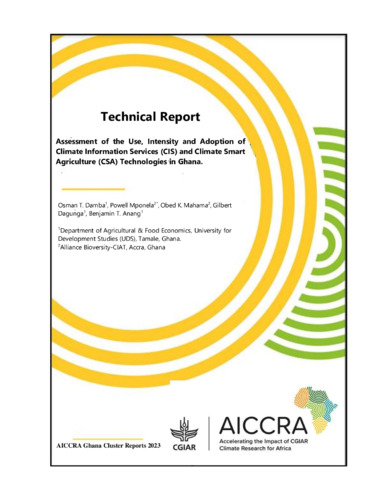Assessment of the use, intensity and adoption of Climate Information Services (CIS) and Climate Smart Agriculture (CSA) technologies in Ghana.
Building on the successes from previous projects such as CCAFS and addressing emerging issues, the World Bank supports the CGIAR to accelerate climate research in Africa. As a mode of implementation, AICCRA deployed several CIS-CSA technologies from an initial 22 prioritized to 5 for each of the 6 value chains in Ghana. Scaling options were through demo sites at both individual farmer and community-level farm accompanied by field days.
This study assessed the level of use, intensity of use leading to possible adoption of Climate Information Services (CIS) and climate smart Agricultural (CSA) technologies in the 6 AICCRA-Ghana intervention regions of Ghana. Specifically, this study assessed the sex desegregated technologies used and the level of use along the various maize, cowpea, yam, sweet potato and tomato value chains. Also, the study assessed the rate of adoption of the various technologies and role these technologies influence farmers decisions at various stages in the season.
AICCRA has enhanced access and usage of CIS information from 1-32% in 2021 to up to 4-34% in 2023. The new technologies for climate adaptation, stress tolerant variety, usage among AICCRA participants increased from 25 to 34%, diversified farming though crop rotation increased from 15 to 25%, and one-health practice of biopesticide use increased from 1% to 6%. Interestingly, AICCRA has increased generation and dissemination of knowledge though local systems. Farmer-farmer knowledge sharing helps to scale usage of CIS as evidenced by higher usage among network than control farmers. This entails that, in addition to direct contact and engagement, the AICCRA approaches foster local knowledge transfer which is essential for sustainability and widespread usage of innovations. Future efforts should be directed at enhancing local knowledge systems by building the capacity of lead farmers in societies.
The result from the study supports evidenced based implementation strategy formulation in other regional and national projects including the Food System Resilience Program (FSRP) and the Fertilizer and Soil‐Health Roadmap for West Africa and Sahel. These will ensure enhancement of access to digital advisory services for food crisis prevention and use of CSA to build resilience of the food systems productive base. The evidence from AICCRA Ghana cluster on use of CIS and CSA for climate change mitigation is also vital to guide the scaling of CGIAR climate innovations to other countries in the region.

